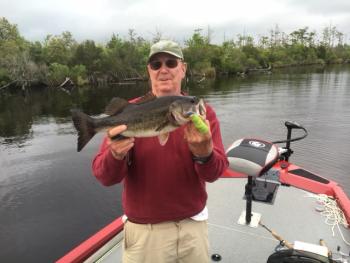Mac Currin

1997 North Carolina Fisheries Reform Act
The Fisheries Reform Act is the most significant fisheries legislation in NC history.
In 1994, the North Carolina General Assembly approved a moratorium on the sale of new commercial fishing licenses and established the 19-member Fisheries Moratorium Steering Committee to oversee a study of the state's entire coastal fisheries management process and to recommend changes to improve that process. The Moratorium Steering Committee included legislators, fisheries managers, scientists, commercial fishermen, and recreational fishermen. The committee commissioned six research studies and reviewed a broad range of issues, including fishing licenses, fishing gear, habitat protection, agency organization, and law enforcement. The committee issued a draft report in the late summer of 1996, held 19 public meetings across the state, and adopted a final report in October 1996 that formed the basis for the Fisheries Reform Act. Governor James B. Hunt signed the Act into law on August 14, 1997.
The 1997 North Carolina Fisheries Reform Act: An Oral History Perspective was made possible by the North Carolina Sea Grant Community Collaborative Research Grant Program.
Mary Williford
Mac Currin, born in 1950 in Henderson, North Carolina, has had a diverse professional background, primarily centered around marine biology and fisheries. After completing his undergraduate studies, he began his career as a school teacher before transitioning to a research role at N.C. State University, where he worked with Dr. John Miller for approximately 16-17 years. During this time, he also earned his Master's degree. Currin's work focused primarily on research related to small marine fish. He also served as a Biologist on the staff of the Outer Continental Shelf Office, where he coordinated the state's opinion on the proposed Mobil oil well off of Salvo. After this role ended, Currin began conducting fishing schools, a role he continued on a contract basis with N.C. State University until around 2012 or 2013. In addition to his professional roles, Currin has been deeply involved in fisheries management and policy, including his involvement with the Coastal Conservation Association [6]. He has also been involved with the Moratorium Steering Committee meetings and has played a significant role in the Fisheries Reform Act process.
Scope and Content Note
This interview with Mac Currin, conducted by Sara Mirabilio on June 27, 2016, provides a comprehensive overview of Currin's life, professional background, and his involvement in fisheries management and policy in North Carolina. The interview begins with a discussion of Currin's early life and professional background, including his work as a research technician at N.C. State University and his role as a Biologist with the Outer Continental Shelf Office. The conversation then shifts to Currin's involvement with fisheries management and policy, including his work with the Coastal Conservation Association and the Moratorium Steering Committee. The interview also delves into the Fisheries Reform Act, discussing its successes, weaknesses, and future issues. Currin shares his thoughts on the Act's impact on the commercial fishing industry, the implementation of the Coastal Habitat Protection Plan (C.H.P.P.) system, and the role of recreational angling in coastal communities. The interview provides valuable insights into the complexities of fisheries management in North Carolina, the challenges and successes of the Fisheries Reform Act, and the future of the state's commercial fishing industry.
Please Note: The oral histories in this collection are protected by copyright and have been created for educational, research and personal use as described by the Fair Use Doctrine in the U.S. Copyright law. Please reach out Voices@noaa.gov to let us know how these interviews are being used in your research, project, exhibit, etc. The Voices staff can help provide other useful resources related to your inquiry.
The NOAA mission is to understand and predict changes in climate, weather, oceans, and coasts, to share that knowledge and information with others, and to conserve and manage coastal and marine ecosystems and resources. The Voices Oral History Archives offers public access to a wide range of accounts, including historical materials that are products of their particular times, and may contain offensive language or negative stereotypes.
Voices Oral History Archives does not verify the accuracy of materials submitted to us. The opinions expressed in the interviews are those of the interviewee only. The interviews here have been made available to the public only after the interviewer has confirmed that they have obtained consent.
